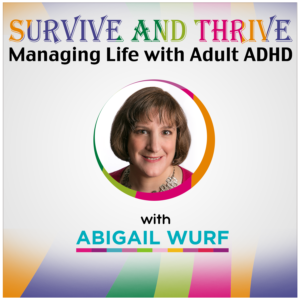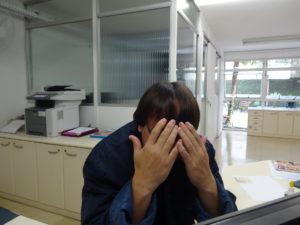 Find past episodes of the show below and be sure to subscribe on iTunes so you never miss an episode.
Find past episodes of the show below and be sure to subscribe on iTunes so you never miss an episode.
ADHD and Romantic Healthy Relationships
As an ADHD coach, people come to me to get support to live their best possible life, something that ADHD often gets in the way of. Often they already have some support which is great as long as it is a healthy kind of support. Unfortunately, especially in romantic relationships support can turn in to something that is not healthy. The most common case is when the romantic partner or spouse becomes more of a parent than a partner.
This can happen quite easily. The non-ADHD partner loves the ADHD partner and wants to be helpful and supportive. This is good provided the help doesn’t turn into a form of parenting. Then the relationship ceases to be one of equals. The ADHD partner becomes the child in the relationship. The non-ADHD partner becomes responsible not only for his/her life but also the life of the partner. This is unfair and can damage the intimacy within a couple.
There is a difference between being supportive and taking responsibility for someone else’s life. When a couple’s parent/child relationship develops a lot of resentment arises. The parent/partner resents losing a full partner and getting the added burden of being a parent to their partner. The child/partner resents being treated like a child and not a full partner.
The problem lies in each partner not understanding what their role should be in the relationship. The child/partner allows the parent/partner to take responsibility because it is easier than taking responsibility themselves because of the ADHD. The parent/partner is often frustrated and figures it is just easier to take responsibility for things so that balls don’t get dropped.
The key is to figure out the best division of labor and how each partner can support the other. This means the ADHD affected partner must not decide that because somethings are hard for them to do and so they don’t even try. This also means the non-ADHD partner should not have unrealistic expectations of their ADHD affected partner. Each couple plays this out differently. Constant communication is important so both parties are clear about what their needs are and that their expectations are realistic.
It is important to remember there are many different ways to do most anything. There is more than one way to load the dishwasher so that the dishes will get clean. Your way of doing it might seem to best way but it isn’t always better. Done is better. I have worked with many couples through my ADHD coaching services and often couples get stuck because the way the ADHD affected person does things may not be the most efficient way to do them in the eyes of the non-ADHD partner. This can be frustrating. It is important to remember there is often more than one way to do something. If it gets the task done one way or another isn’t better or worse just different.
Most important is that couples find ways to balance their relationships so that neither partner feels the other is taking complete charge – becoming the parent in the relationship. Also that neither partner is completely abdicating responsibility – becoming the child in the relationship.
ADHD impacts both the person who is affected by it and that person’s partner. ADHD is not easy to live with but it is doable.
ADHD and Taking Care of Yourself – Little Steps at a Time
We often do better caring for others than for ourselves. Add ADHD into the mix and things get even more complicated. We may feel we are failing on multiple fronts – caring for ourselves and caring for others. I am a firm believer that in order to give our best to others we need to do our best for ourselves as well. That gives us the fuel to support others.
What does caring for ourselves mean? There is the obvious – good nutrition, enough restorative sleep each night and regular exercise. ADHD can cause us to struggle even with these basics. For example, many people affected by ADHD struggle with planning, organizing and time management that makes eating properly, regular sleep and enough exercise a challenge. Unfortunately, they are necessary tasks. Food, sleep and exercise are vital for a good quality sustained existence.
If you can’t do it alone get some help. The help can come in a variety of forms such as your partner, family, friends, support groups, services, coaches and therapists. What is important is that you take action. No matter how small to try and move yourself forward in regards to food, sleep and exercise. Every little micro action you take is further along than giving up and doing nothing.
This is hard. We like big action and grand gestures but they often aren’t sustainable long term. What little thing can you do today to help in your pursuit of eating healthy, getting regular sleep and exercising? It may be starting to walk once a week for a half hour, going to bed a little earlier or cutting a certain junk food out of your diet. Each step forward improves the opportunity for success. Sure, you will fail sometimes. Forget some days to do the incremental step forward you have chosen. But the answer is simple. Try again the next day. That is all that you have to do – to try again the next day each time you fall back. Take each day as it comes.
Find a friend to take a weekly walk with. Prepare and eat a meal with someone else who has better eating habits than yourself. Set an alarm an hour before you plan to go to bed to start getting ready for bed and do sleep encouraging activities. All of these actions cost little or no money.
After you take one micro step forward add another. That may be going for a walk two or three times a week, sticking to a more reasonable bedtime, shifting what you buy at the grocery store, or some other step forward. Keep adding little steps forward and you’ll get where you want to go. You will fall off the wagon sometimes. That doesn’t mean the changes aren’t working. You just need to climb back on the wagon as quickly as possible.
ADHD can be frustrating. It often makes it hard for us to put out consistent effort on something especially if it is something that is not of great interest to us. It is a life time battle. But a worthy battle. Taking better care of ourselves helps us to live a better quality of life and be a better human being to the people in our lives.
Intentions Versus Resolutions
In January many people make resolutions. I am not a big fan of making resolutions. I like intentions better than resolutions.
A resolution is a firm decision to do or not to do something. An intention is an aim or a plan. To me intentions provide flexibility enough to move and grow with you as things in life inevitably change and grow. Resolutions seem pass/fail to me. You either lost the 12 pounds or you didn’t. Whereas an intention to begin creating a healthier lifestyle has many facets and opportunities for success. If you lose 12 pounds that great but it is more important to be intentionally living a healthier lifestyle.
In coaching we talk about holding our client’s agenda. There are little agendas and big agendas. Little agendas are the small picture things and are of the moment. Big agendas are the big picture of living a fulfilling life, a life in balance and being present.
Often resolutions are little agenda items and intentions are big agenda items. I believe if you are working with intentions you are working toward the big picture of living a balanced fulfilling life. I also believe that if you are working on the big picture it will affect the little pictures of life. They will begin to take care of themselves.
Now to the idea that you begin in January. Resolution creating tends to happen more in January. I think two things are in play here. We get more introspective during the holidays and subject to marketing surrounding the idea of the new year – the new start. That is all fine but limiting. I want to be creating and living intentions throughout the year so that I can be responsive to the changes in my life and the lives of others during the year. This creates a perpetual growth cycle.
As I mentioned intentions are about aims and plans. All aims and plans need to be revisited periodically to respond to the changing world. In December I often plan the year coming up for my ADHD coaching business. But I also plan again at least in June or July, and often if I remember in March or April and in September. I simply know more each time I revisit my plans. I can get rid of things that are not working and take on new opportunities.
Whether it is January or another month big picture intentions are important. It gives you direction which helps you to move your life forward. Revisiting those intentions periodically to see if they need revision or to be thrown out completely and others developed is key.
ADHD and Wellness
 One of the sessions I attended at the 2019 Annual International Conference on ADHD was about ADHD and wellness. The presenters focused on the four pillars of wellness – nutrition, sleep, exercise and stress. Wellness is important to managing ADHD. We must eat healthy, sleep enough, get exercise regularly and reduce stress. I believe this is hard for most people but especially so for those affected by ADHD. Follow through and consistency can be difficult for us.
One of the sessions I attended at the 2019 Annual International Conference on ADHD was about ADHD and wellness. The presenters focused on the four pillars of wellness – nutrition, sleep, exercise and stress. Wellness is important to managing ADHD. We must eat healthy, sleep enough, get exercise regularly and reduce stress. I believe this is hard for most people but especially so for those affected by ADHD. Follow through and consistency can be difficult for us.
Now I am not going to discuss nutrition because I don’t know much about it. It is something I hope to learn more about in the near future.
Sleep can be difficult for those affected by ADHD. We often have trouble falling asleep and some people also have difficulty staying asleep. Many of my clients say their mind has trouble quieting down so they can fall asleep. What I have found most helpful is listening to podcasts as I go to sleep. I choose podcasts that are interesting but not riveting. Interesting so that I stop thinking but not riveting so that I do not get sucked in to listening until the end of the podcast. It takes some time to find the right podcasts. One that is specifically designed to help you fall asleep is the podcast Sleep with Me. It works for some of my clients and not for others but it is worth checking out. I also tend to listen to old time radio broadcasts. They distract me enough from my own thoughts but do not pull me in so that I want to stay awake.
A lot of people affected by ADHD stay up too late and get a second wind and then find it difficult to fall asleep. Set a standard bedtime and then an hour before start to wind down and get ready for sleep. Many of my clients set an alarm for an hour or 45 minutes prior to bedtime to help them remember to start quieting down and get ready for sleep.
Exercise is also important for managing ADHD. After exercising we are often able to focus better. If you are not already exercising set a realistic goal and start small. I have clients who try to go from no exercise to five times a week and often experience failure. This discourages them. It is better to start small and build slowly. The best scenario is to find someone or a group to exercise with to hold you accountable. If not that then an accountability partner or coach to support you in your exercise goals.
Finally, stress. Stress can exacerbate our ADHD symptoms. It makes it difficult to focus and sleep and can even affect your eating. All those can contribute to our difficulties. Do some reading on mindfulness exercises. Simply breathing in for a few counts, holding for a moment and then exhaling slowly can be helpful to do a few times to help you calm down and get more oxygen in. If you are interested in learning more about mindfulness and ADHD I recommend the book “The Mindfulness Prescription for Adult ADHD” by Lidia Zylowska, MD.
Of nutrition, sleep, exercise and stress, I would pick one to start working on and as you get some success under your belt add another to start working on and so forth. Instead of trying to change too much at once, failing, and then getting discouraged go slowly. Take baby steps. Celebrate even small milestones of success to encourage yourself to keep going.
KISS – Keep it Simple Sweetheart
 Having ADHD myself and coaching people affected by ADHD over the years I recognized that we have a habit of creating complicated systems and processes that get in our way. The problem is follow-through. It is exciting to set up the system because it is “Bright, shiny and new.” Maintaining the system is difficult for us if it is time consuming or complicated.
Having ADHD myself and coaching people affected by ADHD over the years I recognized that we have a habit of creating complicated systems and processes that get in our way. The problem is follow-through. It is exciting to set up the system because it is “Bright, shiny and new.” Maintaining the system is difficult for us if it is time consuming or complicated.
The same is true with big projects and tasks. We spend so much time thinking about what is the best way to do the task that often we could have completed the task in the same time. Don’t get me wrong – we struggle with figuring out how to get started on tasks and how to approach them. Unfortunately we get caught up in trying to find the “Perfect” way to do the task and end up spending too much time thinking about method. That often means we run out of time to get the task done.
If both cases I try to remember KISS. Or at least my version of KISS that is “Keep it Simple Sweetheart.” I get that process can be important but you fail if you spend so much time on process that you don’t get the task done or don’t utilize a system because it is too complicated and time consuming.
An example I use often is how I paid my bills before electronic bill paying. I made a folder for every vender I paid a bill to. So one folder for electric, one for gas, one for rent, one for my landline, one for my cell, etc. I often paid bills late because I couldn’t find them. The reason I couldn’t find the bills is I never filed them so a huge pile of paid and unpaid bills would build up waiting to be filed which never seemed to happen.
Then it was suggested to me that I make one file for paid bills. Once paid the bill would go into the file. I argued against this because what if I needed to find a bill again I would never find it. It was pointed out to me that the bills in the folder would by default end up in chronological order so they would be easy to find. This was true and as I adapted this method I never had trouble finding an old bill. My initial system was too cumbersome and therefore I didn’t use it. We need simple, easy and quick solutions to maintain a process or get a project done.
So next time you are setting up a system or starting a project ask yourself intermittently: Am I making it so complicated it just doesn’t get done in time.
ADHD and Shame
 As an ADHD coach I work with adults and college students affected by ADHD. I have noticed that both populations feel shame regarding ADHD.
As an ADHD coach I work with adults and college students affected by ADHD. I have noticed that both populations feel shame regarding ADHD.
ADHD can be a life long struggle. Throughout life you hear negative messages from people and from yourself about your ability to get things done and to stay on task. Some years ago my mother found notes from my teachers when I was in elementary school. All the notes said basically the same thing – if only I would apply myself I could do the work and that I wasn’t fulfilling my potential. Although I didn’t see the notes I certainly got the message when I was a child that I was letting people down and that if only I tried harder everything would be better. My conclusion – I must be stupid and lazy.
Those messages don’t just end in childhood. Even as adults we are constantly bombarded with negative messages. We are aware that our actions or lack of action disappoints and frustrates others. It makes sense. When you are at work and you don’t do your part in a timely manner it can adversely affect others and their work. This can definitely be frustrating for everyone.
There is no perfect solution. But one needs to be aware of the feeling of shame in order to avoid reacting to it by withdrawing from others, seeking to be perfect or giving up altogether. These are not solutions. They are avoidance. And giving up gets you nowhere.
The way to deal with shame is to meet it head on and get support. That support can come from family, friends, therapists and coaches. You can also join groups like ADDA and CHADD. Both are organizations that provide information and support for people affected by ADHD. You need some people in your corner who understand what ADHD is and what it means to live with it. For each person with ADHD helpful support can mean different things. For example nagging someone to get something done tends to shut down many affected by ADHD. But an offer to sit with the person while they work on the task can be helpful.
You want support from people who want to see you achieve willing to have you tell them what behaviors are helpful and what behaviors are not. If you feel overwhelming shame it is difficult to ask for help but it is vital. Building a support network around you can help you live a life that is satisfying. Of course it won’t be perfect but perfection can be boring. It will still be a hard life but less hard for you if you can accept who you are and let go of dwelling in the land of shame.
